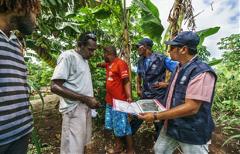
World Malaria Day is commemorated every 25 April. This year WHO joins partner organizations in promoting the theme; Ready to Beat Malaria. It underscores the collective energy and commitment of the global malaria community in uniting around the common goal of a world free of malaria. In the Western Pacific Region, the theme highlights the commitment of its Leaders to attain a malaria-free Asia Pacific by 2030.
The Western Pacific Region has made significant progress in efforts to control and eliminate malaria since 2000. Between 2010 and 2015 alone, the region has reduced the case incidence rate of malaria by 30% and its mortality rate by 58%. Both reductions are higher than global achievements for the same period. However, there are reasons to be concerned about more recent global and regional trends.
The World Malaria Report, released by WHO in December 2017, highlighted that global progress against malaria has stalled for the first time in recent years. In the Western Pacific Region the total number of malaria cases reported in 2016 increased by more than a third compared with 2015. Contributing to this was an outbreak in 2016 in Papua New Guinea our highest burden country - where nearly 80% of cases and 90% of deaths in the Region occur. However, 2016 was also noteworthy as China for the first time reported no locally transmitted malaria throughout the year.
A particular challenge in the Region is partial resistance to artemisinin and its partner antimalarial drugs (called artemisinin combination therapies or ACTs) in the Greater Mekong Subregion. These drugs are the first-line treatments for malaria and are crucial for further progress. WHO implemented the Emergency Response to Artemisinin Resistance in 2013 and adopted the Strategy for malaria elimination in the Greater Mekong Subregion 2075-2030 in 2015 to tackle this challenge. These concentrated efforts have contributed to reducing the annual number of malaria cases and deaths in the Greater Mekong Subregion by more than 85% between 2012 and 2016.
This progress in the Greater Mekong Subregion and the continuing progress in many of the endemic countries in the Western Pacific Region have been achieved through strong national ownership of programmes and the political commitment of leaders as well as the commitment of donors and partners in supporting national efforts. The Regional Action Framework for Malaria Control and Elimination in the Western Pacific 2076-2020 endorsed by the Regional Committee in 2016 is further contributing to accelerated control and elimination in countries by supporting the adoption and implementation of aligned national strategies.
While increased financing contributed to the progress achieved across the Region over the last decade and continues to do so a recent decline in both domestic and international financing of malaria control efforts in some of our highest-burden countries has contributed to recent outbreaks jeopardizing the achievement of national targets. Increasing current funding for malaria in the Region, including domestic funding, is imperative to sustaining the gains and making progress.
WHO is calling on malaria-affected countries, partners and donors to boost investments and efforts to reduce the disease burden through coordinated efforts to strengthen national capacities and ownership as well as funding for scaling up preventive interventions to ensure universal coverage of all at-risk populations in the Region.
Country Leaders have committed to achieving an Asia Pacific Region free of malaria by 2030, so this World Malaria Day we must commit to jointly realizing that vision so we can beat malaria and end malaria for good in our part of the world.

/59748.tmb-300v.png?sfvrsn=9885965b_2)


